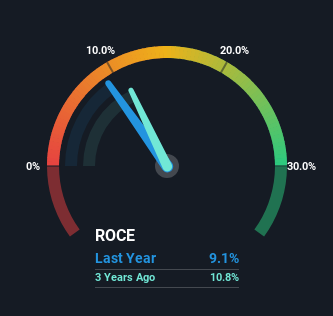Investors Could Be Concerned With InfoBeans Technologies' (NSE:INFOBEAN) Returns On Capital
Did you know there are some financial metrics that can provide clues of a potential multi-bagger? Firstly, we'll want to see a proven return on capital employed (ROCE) that is increasing, and secondly, an expanding base of capital employed. If you see this, it typically means it's a company with a great business model and plenty of profitable reinvestment opportunities. In light of that, when we looked at InfoBeans Technologies (NSE:INFOBEAN) and its ROCE trend, we weren't exactly thrilled.
Understanding Return On Capital Employed (ROCE)
For those who don't know, ROCE is a measure of a company's yearly pre-tax profit (its return), relative to the capital employed in the business. To calculate this metric for InfoBeans Technologies, this is the formula:
Return on Capital Employed = Earnings Before Interest and Tax (EBIT) ÷ (Total Assets - Current Liabilities)
0.091 = ₹318m ÷ (₹4.0b - ₹561m) (Based on the trailing twelve months to June 2024).
So, InfoBeans Technologies has an ROCE of 9.1%. Ultimately, that's a low return and it under-performs the Software industry average of 14%.
Check out our latest analysis for InfoBeans Technologies

Historical performance is a great place to start when researching a stock so above you can see the gauge for InfoBeans Technologies' ROCE against it's prior returns. If you'd like to look at how InfoBeans Technologies has performed in the past in other metrics, you can view this free graph of InfoBeans Technologies' past earnings, revenue and cash flow.
What Does the ROCE Trend For InfoBeans Technologies Tell Us?
In terms of InfoBeans Technologies' historical ROCE movements, the trend isn't fantastic. To be more specific, ROCE has fallen from 12% over the last five years. Meanwhile, the business is utilizing more capital but this hasn't moved the needle much in terms of sales in the past 12 months, so this could reflect longer term investments. It's worth keeping an eye on the company's earnings from here on to see if these investments do end up contributing to the bottom line.
While on the subject, we noticed that the ratio of current liabilities to total assets has risen to 14%, which has impacted the ROCE. Without this increase, it's likely that ROCE would be even lower than 9.1%. While the ratio isn't currently too high, it's worth keeping an eye on this because if it gets particularly high, the business could then face some new elements of risk.
The Key Takeaway
To conclude, we've found that InfoBeans Technologies is reinvesting in the business, but returns have been falling. Investors must think there's better things to come because the stock has knocked it out of the park, delivering a 667% gain to shareholders who have held over the last five years. However, unless these underlying trends turn more positive, we wouldn't get our hopes up too high.
One more thing to note, we've identified 1 warning sign with InfoBeans Technologies and understanding this should be part of your investment process.
If you want to search for solid companies with great earnings, check out this free list of companies with good balance sheets and impressive returns on equity.
New: AI Stock Screener & Alerts
Our new AI Stock Screener scans the market every day to uncover opportunities.
• Dividend Powerhouses (3%+ Yield)
• Undervalued Small Caps with Insider Buying
• High growth Tech and AI Companies
Or build your own from over 50 metrics.
Have feedback on this article? Concerned about the content? Get in touch with us directly. Alternatively, email editorial-team (at) simplywallst.com.
This article by Simply Wall St is general in nature. We provide commentary based on historical data and analyst forecasts only using an unbiased methodology and our articles are not intended to be financial advice. It does not constitute a recommendation to buy or sell any stock, and does not take account of your objectives, or your financial situation. We aim to bring you long-term focused analysis driven by fundamental data. Note that our analysis may not factor in the latest price-sensitive company announcements or qualitative material. Simply Wall St has no position in any stocks mentioned.
About NSEI:INFOBEAN
InfoBeans Technologies
Designs, builds, and manages digital applications in the United Arab Emirates, Germany, India, the United States, and internationally.
Flawless balance sheet with solid track record.
Similar Companies
Market Insights
Community Narratives


Recently Updated Narratives


No miracle in sight


Q3 Outlook modestly optimistic


Alphabet: The Under-appreciated Compounder Hiding in Plain Sight
Popular Narratives


The company that turned a verb into a global necessity and basically runs the modern internet, digital ads, smartphones, maps, and AI.


MicroVision will explode future revenue by 380.37% with a vision towards success



